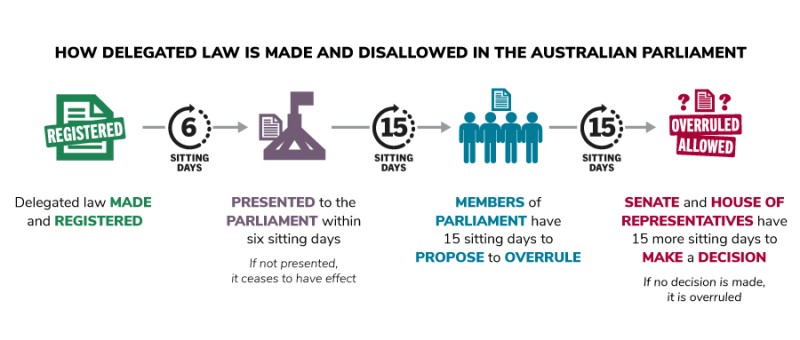How can delegated legislation be disallowed?
Many laws give the Australian Government the power to make decisions about the detail of how the law will be put into action. The government does this by making delegated legislation in the form of regulations, ordinances and orders. Delegated legislation has the same force as other laws made by the Australian Parliament.
Delegated legislation becomes law on the day it is registered. It must be presented to the Senate and House of Representatives within 6 sitting days of registration. The Parliament can then decide if it wants to disallow – cancel – the delegated legislation.
As with other laws made by the Parliament, the validity of delegated legislation (if it is lawful) can be challenged in court.

How delegated law is made and disallowed in the Australian Parliament.
Parliamentary Education Office (peo.gov.au)
How delegated law is made and disallowed in the Australian Parliament.

Parliamentary Education Office (peo.gov.au)
Description
This diagram illustrates how delegated law is made and disallowed. After delegated law is made and registered it must be presented to the Australian Parliament within 6 sitting days. (If it is not presented, it ceases to have effect.) Members of parliament have 15 sitting days to propose to overrule the delegated law. The Senate and House of Representatives they have 15 more sitting days to make a decision. If no decision is made, the delegated law is overruled.
This work is licensed under a Creative Commons Attribution-NonCommercial-NoDerivs 3.0 Unported License.
You are free to share – to copy, distribute and transmit the work.
Attribution – you must attribute the work in the manner specified by the author or licensor (but not in any way that suggests that they endorse you or your use of the work).
Non-commercial – you may not use this work for commercial purposes.
No derivative works – you may not alter, transform, or build upon this work.
Waiver – any of the above conditions can be waived if you get permission from the copyright holder.
